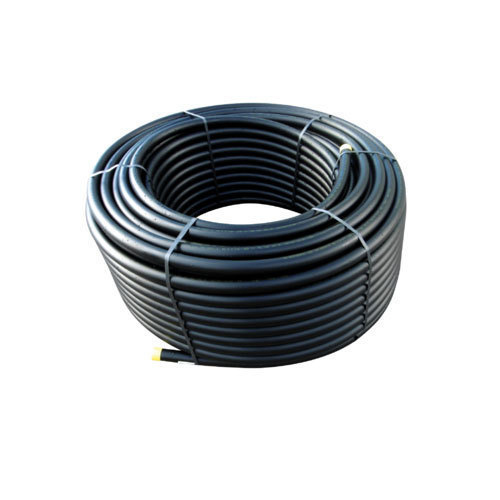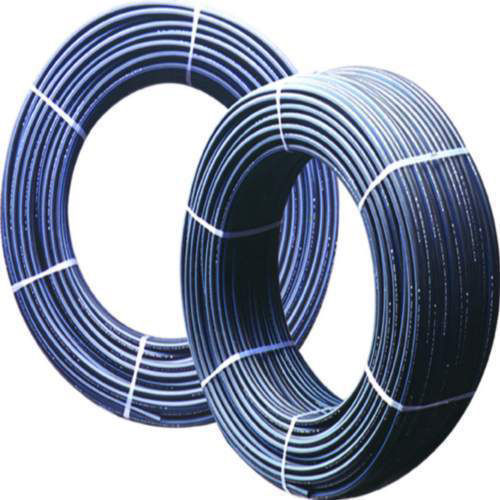
HDPE Cable Duct Coil Pipes
70 INR/Meter
Product Details:
- Application Chemical Handling, Gas Handling
- Product Type Coil Pipes
- Material HDPE
- Length 18 meter Meter (m)
- Click to view more
X
HDPE Cable Duct Coil Pipes Price and Quantity
- 1000 Meter
- 70 INR/Meter
HDPE Cable Duct Coil Pipes Specification
- 18 meter Meter (m)
- Coil Pipes
- HDPE
- Chemical Handling, Gas Handling
HDPE Cable Duct Coil Pipes Trade Information
- 10000 Meter Per Day
- 2-7 Days
Product Description
We are an acclaimed manufacturer of HDPE Cable Duct Coil Pipes for our clients. They are sturdily developed using optimum quality raw HDPE material along with the help of modern tools and equipment at our unit. Our experts conduct various quality inspections to ensure that our pipes are free from any kind of defects. These pipes hence stand high on effectiveness, performance, corrosion resistance, quality and are easy to install as well. We offer these pipes at highly affordable prices.
Uses of HDPE Cable Duct Coil Pipes:
1. Telecommunications Infrastructure: HDPE cable duct pipes are commonly used for laying telecommunication cables, including fiber optic cables and copper cables. The smooth interior of HDPE pipes allows for easy installation and pulling of cables, while the corrosion-resistant nature of HDPE ensures a long-lasting solution for underground or aerial installations.
2. Electrical Conduit Systems: HDPE cable duct pipes are used to protect electrical wiring in both residential and commercial applications. They provide a safe and protective pathway for electrical cables, shielding them from environmental factors and physical damage.
3. Utilities and Gas Distribution: HDPE pipes are used for distributing utilities like water, sewage, and natural gas. Their resistance to corrosion and abrasion makes them a preferred choice for underground utility installations, reducing the risk of leaks and contamination.
4. Irrigation Systems: HDPE cable duct pipes are utilized in agricultural and landscaping applications for creating efficient irrigation systems. Their flexibility and durability make them suitable for both below-ground and above-ground installations.
5. Infrastructure Projects: HDPE pipes are used in large-scale infrastructure projects, such as highways, railways, and tunnels, to house various cables and conduits required for communication, lighting, and other purposes.
6. Cable Protection: In industrial settings, HDPE cable duct coil pipes are used to protect and route cables in environments where they might be exposed to chemicals, moisture, or physical impact. They help maintain the integrity of cables and ensure smooth data or power transmission.
7. Renewable Energy Projects: HDPE pipes play a role in renewable energy projects, such as solar farms and wind farms. They are used to house the cabling necessary for connecting solar panels or wind turbines to the power grid.
8. Data Centers: HDPE cable duct pipes are employed within data centers to manage and organize the extensive cabling required for networking, power distribution, and cooling systems.
9. Marine Applications: HDPE pipes are used in marine and underwater applications due to their resistance to saltwater and chemicals. They can be used to protect underwater cables, pipelines, and other infrastructure.
10. Geothermal Systems: HDPE pipes are used in geothermal heating and cooling systems for transporting fluid to and from the ground for temperature regulation in buildings.
11. Mining and Industrial Sites: HDPE pipes are used in mining operations and industrial sites for various purposes, including transporting fluids, supporting conveyor systems, and protecting cables.
12. Road and Highway Lighting: HDPE pipes can be used to house electrical cables for street lighting systems along roads and highways.
FAQ:
Q1: What is HDPE cable duct coil pipe?
A: HDPE (High-Density Polyethylene) cable duct coil pipe is a type of plastic conduit designed for protecting and housing various types of cables, wires, and conduits. It is known for its durability, flexibility, and corrosion resistance.
Q2: What are the advantages of using HDPE cable duct coil pipes?
A: Some advantages of using HDPE cable duct coil pipes include their resistance to corrosion, chemicals, and abrasion; flexibility for easy installation; lightweight nature; and long service life. They also offer better insulation compared to metal conduits.
Q3: What sizes are available for HDPE cable duct coil pipes?
A: HDPE cable duct coil pipes come in a variety of sizes, ranging from small diameters suitable for fiber optic cables to larger sizes for electrical power cables and utility distribution.
Q4: How are HDPE cable duct coil pipes installed?
A: HDPE cable duct coil pipes are typically installed using trenching, plowing, or directional drilling methods. The coils are unrolled and placed in the desired pathway, either buried underground or installed in an above-ground setup.
Q5: Are HDPE cable duct coil pipes suitable for underground installations?
A: Yes, HDPE cable duct coil pipes are commonly used for underground installations. They offer protection against soil moisture, chemicals, and physical damage, making them a preferred choice for burying cables and conduits.
Q6: Can HDPE cable duct coil pipes be used for aerial installations?
A: Yes, HDPE cable duct coil pipes can also be used for aerial installations, such as attaching them to utility poles or towers. However, proper clamping and securing mechanisms are necessary to ensure stability and safety.
Q7: How does the flexibility of HDPE cable duct coil pipes benefit installation?
A: The flexibility of HDPE cable duct coil pipes allows for easier installation around obstacles and through tight spaces. It also reduces the need for joints, minimizing the risk of leaks and improving overall efficiency.
Q8: Can HDPE cable duct coil pipes withstand harsh environmental conditions?
A: Yes, HDPE cable duct coil pipes are designed to withstand a wide range of environmental conditions, including exposure to UV radiation, extreme temperatures, and various chemicals. This makes them suitable for both indoor and outdoor installations.
Q9: Are HDPE cable duct coil pipes recyclable?
A: Yes, HDPE is a recyclable material. Many HDPE cable duct coil pipes are manufactured using recycled materials, and at the end of their service life, they can be recycled to create new products.
Q10: What is the expected lifespan of HDPE cable duct coil pipes?
A: The lifespan of HDPE cable duct coil pipes can vary depending on factors such as installation conditions, environmental exposure, and maintenance practices. However, they are known for their long service life, often exceeding several decades.
Q11: Are HDPE cable duct coil pipes suitable for transporting fluids?
A: While HDPE pipes are primarily designed for cable protection, they are also used for transporting fluids in various industrial and agricultural applications due to their corrosion resistance and durability.
Q12: How are HDPE cable duct coil pipes joined together?
A: HDPE cable duct coil pipes can be joined using methods such as heat fusion (butt fusion or electrofusion), mechanical couplings, or compression fittings. Heat fusion provides a seamless and leak-free connection.
Q13: What standards and certifications are relevant for HDPE cable duct coil pipes?
A: HDPE cable duct coil pipes should adhere to relevant industry standards and certifications based on their intended use, such as ASTM, ISO, and NEMA standards for different applications.
Q14: Where can I purchase HDPE cable duct coil pipes?
A: HDPE cable duct coil pipes are available from various manufacturers, suppliers, and distributors specializing in plastic conduits and piping systems. They can often be found at hardware stores, construction supply centers, and online retailers.
Tell us about your requirement

Price:
Quantity
Select Unit
- 50
- 100
- 200
- 250
- 500
- 1000+
Additional detail
Mobile number
Email







 Call Me Free
Call Me Free
